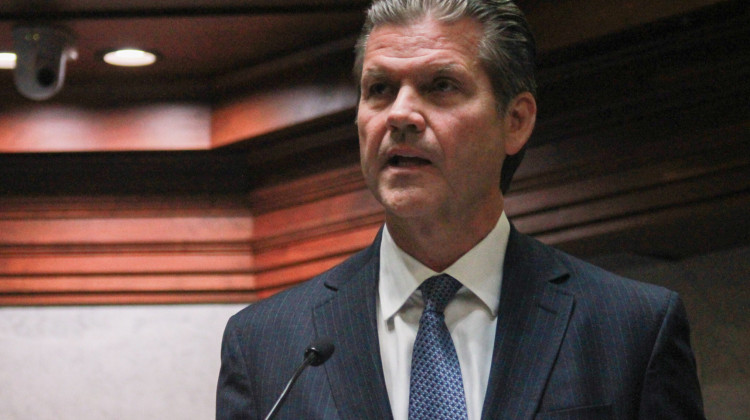
Indiana School Superintendent Jennifer McCormick, left, was part of a panel about the future of Indiana public education with Suellen Reed, center, and Glenda Ritz at the Dean Evans Center in Indianapolis on Saturday, August. 26, 2017.
Eric Weddle/WFYI Public MediaState Superintendent Jennifer McCormick called for more accountability on charter schools and private schools using taxpayer-funded vouchers during a forum Saturday.
The first-term Republican schools chief says her department is “pushing back” against the state’s free-market style of school choice that lawmakers began approving in 2009. McCormick wants all schools receiving tax dollars to face the same academic and financial scrutiny as traditional public schools.
“The baseline of quality choice in Indiana, I think, has got to be examined,” she says. “In my opinion, it should not be a free for all.”
The comments drew hearty applause from the more than 120 people at the annual meeting of the Indiana Coalition for Public Education, a bi-partisan non-profit organization opposing legislation to fund private school vouchers and expand private school tax credits, among other school reform measures.
McCormick was part of a panel at the Dean Evans Center with former state superintendents Glenda Ritz and Suellen Reed.
Reed, also a Republican, was Indiana school chief for four terms ending in 2009.
Ritz, a Democrat, was superintendent for one term marked by political infighting with Republicans lawmakers and former Governor Mike Pence. McCormick, the former Yorktown Schools superintendent, beat Ritz in the 2016 election.
McCormick’s comments were not new but she drew support from an audience that heavily backed Ritz in the last election.
In the past few months McCormick voiced concerns about the state’s Choice Scholarship Program in an NPR report, and as the chairwoman of the State Board of Education voted to sanction Hoosier Virtual Academies charter school for years of academic failures and management concerns.
McCormick, who was elected with donations from special interest groups that advocate for school reforms, says laws allowing charter schools and private schools vouchers are unlikely to change.
Yet, she hopes to persuade lawmakers during the 2019 legislative session to require new levels of transparency, such as financial reports of private schools in the Choice Scholarship program and the training levels of teachers working at charter schools.
“It’s a taxpayer’s right to know. We talk about transparency. We talk about providing a quality experience for students,” she says. “How do we know that is actually happening? I think it is just the right thing to do.”
Republican lawmakers, who control the Statehouse, rejected proposals from Democrats during the last session to require private schools using vouchers to face state audits.
During the forum, the three answered questions about school funding and accountability. They each warned about the impact of state and federal funding cuts will have on schools.
Ritz, who regularly made headlines during bouts of political spats with Pence and his staff, offered a somewhat of warning about the current education climate.
“I came on the scene during the political shift and it is still there,” she says.
While Ritz warned of an ongoing politicization of education, she said those who support public schools must work together.
“I could not be more passionate about all of us as an entity,” she says. “But we can not fight amongst ourselves.”
 DONATE
DONATE







 Support WFYI. We can't do it without you.
Support WFYI. We can't do it without you.